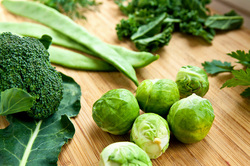 Do you suffer from gas? bloating? discomfort? intestinal irritation? You may have Irritable bowel syndrome or IBS - a condition that's digestive condition characterized by chronic stomach pain, bloating, irregular bowel movements, diarrhea and/or constipation. It's estimated that upwards of 15% of the United States population suffers from IBS, many of whom do not even realize it. I am one of those sufferers, and my symptoms started when I was a teenager. In my 20's I pursued Chinese Medicine for relief and was amazed to find that it completely controlled my symptoms after 3 months of treatment. Unfortunately, after a very high stress time my symptoms returned and I learned I had become Soy and Gluten Intolerant. Now, as long as I avoid those foods, get regular Acupuncture and maintain a healthy diet my IBS symptoms are under control. What is a healthy diet you might ask? That can be highly individual, aside from the expected - avoiding foods I'm allergic to, avoiding sugar, high alcohol intake and caffeine. Diet, exercise and alternative interventions like Acupuncture really can be the key to easy management of IBS and even though there's no known cure for IBS, individuals can definitely prevent symptoms from occurring. In lieu of personalized dietary counseling, here is a Top 4 List of foods to avoid if you have IBS to help keep symptoms at bay. Brussels Sprouts Although they are loaded in beneficial nutrients like vitamin K, vitamin C, vitamin B6, folate, manganese and fiber, Brussels sprouts should be avoided by people with IBS. This fun-sized vegetable can worsen the symptoms of IBS by promoting excess gas and abdominal pain. While each and every case of IBS is unique, most people report adverse symptoms after consuming Brussels sprouts. Broccoli Another food that you should consider avoiding raw is broccoli. This crunchy, stalky vegetable is high in fiber and it promotes gas – two elements that can worsen IBS symptoms. It's important to note, however, that cooking broccoli may eliminate some or all of its negative effects. So if raw, uncooked broccoli triggers a bout of IBS, try steaming or sautéing it. A quick toss with some olive oil, lemon juice and a dash of salt and voila - delicious, less (or no!) gas producing broccoli is at your disposal. Cooking broccoli may allow you to reap the nutritional benefits of this vegetable without irritating your digestive system. The truth is that any high-fiber vegetable may cause digestive issues in people with IBS, so don't assume that broccoli and Brussels sprouts are the only culprits, but these two have been commonly reported as irritants. Milk You may want to think twice before eating a milk-filled bowl of cereal for breakfast in the morning, as it can worsen IBS symptoms. Normally, the small intestines do a pretty good job at breaking down lactose. If there's no enough enzymes to perform this operation, however, some of it will travel to the large intestines where the it's fermented. Not only will this cause gas, but it can also cause bloating, cramps, spasms and diarrhea. Beans It should come as no surprise that beans is on our list of foods for IBS sufferers to avoid. Beans (legumes) contain a special type of sugar known as oligosaccharide, which the body is unable to break down. Since they aren't broken down in the same manner as other sugars, oligosaccharides pass through the small and large intestines, at which point bacteria converts them to gas. Interested in Learning More? I actually wrote a research paper on IBS which you can access HERE on my website for more detailed information about IBS from a Chinese Medicine perspective. Regardless, if you're looking for advice or treatment from someone who understands, please contact me today to learn how you can get on track to better health. Until next time, ~Rebecca |
AuthorsRebecca M H Kitzerow is a Licensed Acupuncturist practicing in La Center, Washington. With over a decade of experience she has won 10 Nattie consumer choice awards from Natural Awakenings Magazine since 2014. Archives
July 2024
Categories
All
|
Photos from Hey Paul Studios, BeGreen_Studio, Pawel Pacholec, 1950sUnlimited, toulupaliaqaz, Joelk75, OnTask, Robert Gourley, cnu_sports, Mitya Ku, wuestenigel (CC BY 2.0), FootMassagez, 401(K) 2013, Mariana Heinz, @EdwardTerry, fishhawk, liverpoolhls, torbakhopper, Boemski, dolomitibl, Driscolltheque, Dave n Laura, Vaping360, MVWorks, Life Mental Health, MVWorks, mikefats, Scot Nelson, jfl1066, wZa HK, ruurmo, Guadalupe Cervilla, Army Medicine, GViciano, torbakhopper, adrigu, Saulo Cruz, Ben Cumming, marniejoyce, kcxd, JasonCorey, kanenas.net, Live to Create Photography, gm.esthermax, Unique Hotels Group, Zenspa1, mysiana, Tobias Lindman, Leader Nancy Pelosi, Kristoffer Trolle, swanksalot, Bill Selak, Parker Knight, stimpsonjake, Gedankensprudler, SuperFantastic, tonynetone, marniejoyce, JeepersMedia, Illusive Photography, 'Ajnagraphy', Iban Torras, scotted400, gtall1, dvanzuijlekom, BPPrice, Skley, torbakhopper, Renato Ganoza, anka.albrecht, QUOI Media, Public Domain Photos, Instant Vantage, Victor Tongdee, Free Grunge Textures - www.freestock.ca, sportEX journals, Nadja Tatar, angela n., marniejoyce, MVWorks, Karolina Kabat, Thomas Fisher Rare Book Library, UofT, ginnerobot, tracilawson, haven't the slightest, My Photo Journeys, Pierre Willemin, Florena_Presse, SuperFantastic, colindunn, zzkt, TraumaAndDissociation, ER24 EMS (Pty) Ltd., shixart1985 (CC BY 2.0), marniejoyce, Tomás Fano, freestock.ca ♡ dare to share beauty, Archives New Zealand, Jaykhuang, airdrie.m, Go-tea 郭天, OnTask, wuestenigel, focusonmore.com, Disney | ABC Television Group, Andrew Gustar, Didriks, ConstructionDealMkting, charlywkarl, barnimages.com, Lel4nd, runwaypilates, michaelstephanfotografie, McLevn, TraumaAndDissociation, eLife - the journal, Lars Plougmann, wuestenigel, shixart1985, boviate, davis.steve32, kevin dooley, @the.photoguy (insta), frederic.gombert, Feathering the Nest, Victor Tondee, shixart1985, wuestenigel, Joe K Gage, kennethkonica
 RSS Feed
RSS Feed
